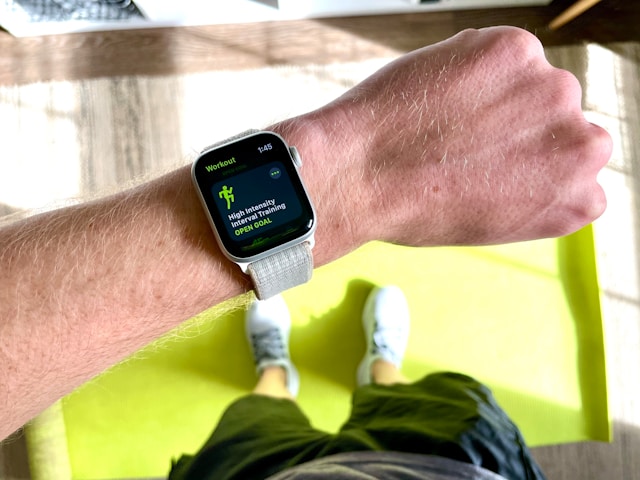From smartwatches to AI-driven apps, technological advancements are enhancing health monitoring and disease prevention globally
In the era of digital health, wearable technology and artificial intelligence (AI) are reshaping how individuals manage their well-being. Devices like smart watches, smart rings, and fitness trackers are no longer just accessories; they serve as proactive health monitors, tracking vital signs and providing early warnings for potential health issues.
For instance, smart rings, discreetly syncing with smartphones, monitor metrics such as body temperature and heart rate, offering users real-time insights into their health status without the need for a screen. This technology, exemplified by roundtable moderator Michael Mol’s experience, integrates seamlessly into daily routines, providing actionable data like energy levels derived from comprehensive health metrics.
Embed from Getty ImagesBeyond wearables, AI-driven tools are pivotal in mental health management. Conversational AI platforms like Wysa provide users with an empathetic, non-judgmental space to discuss mental health concerns. Pranav Gupta from Wysa notes that individuals are often more comfortable opening up to AI than to humans due to reduced stigma and embarrassment associated with seeking mental health support.
The evolution of digital platforms has democratized access to personalized health information. Apps like FatSecret and MyFitnessPal enable users to track nutrition, manage calorie intake, and monitor dietary balance, empowering informed decisions towards healthier lifestyles. These advancements align with efforts to extend the health span—the period of life spent in good health—beyond the traditional lifespan.
Moreover, technologies such as photoplethysmography (PPG) in facial scans, used by platforms like Momentum Multiply, offer rapid health assessments previously requiring lengthy consultations. This innovation facilitates early detection of health risks, enhancing preventive healthcare strategies.
However, amidst the benefits, challenges persist. Neurologist Dr. Kirti Ranchod emphasizes the importance of managing digital health data responsibly to avoid overwhelming users with potentially distressing information. She advocates for integrating incentives and community support within digital health tools to foster positive behaviour changes and emotional well-being.
Analysis:
Political Perspective: The adoption of wearables and AI in healthcare underscores global efforts towards enhancing public health infrastructure. Governments and policymakers are increasingly supportive of initiatives that leverage technology to reduce healthcare costs and improve health outcomes across populations.
Social Implications: Socially, these technologies promote health literacy and empower individuals to take proactive steps towards their well-being. They also address stigma associated with mental health by offering accessible and discreet support mechanisms.
Ethical Considerations: Ethically, the use of AI in healthcare raises concerns about privacy, data security, and the role of technology versus human interaction in patient care. Striking a balance between technological advancements and ethical standards remains critical for sustainable health innovation.
Economic Impact: Economically, investments in digital health technologies drive market growth while potentially reducing long-term healthcare expenditures through preventive care and early intervention strategies. However, disparities in access to technology and digital literacy must be addressed to ensure equitable health benefits globally.
Technological Advancements: Technologically, wearables and AI represent a paradigm shift in healthcare delivery, moving towards personalized medicine and real-time health monitoring. Continued research and development are crucial for advancing these innovations and optimizing their impact on public health.

Mitolyn
Mitolyn reviews
Mitolyn review
I like this web site its a master peace ! Glad I observed this on google .
Mitolyn reviews
Mitolyn review
Mitolyn
Mitolyn reviews
Mitolyn review
Lipozem
PROSTAZEN REVIEWS
Thank you for sharing excellent informations. Your web-site is very cool. I’m impressed by the details that you?¦ve on this website. It reveals how nicely you understand this subject. Bookmarked this web page, will come back for more articles. You, my friend, ROCK! I found simply the information I already searched all over the place and just couldn’t come across. What a perfect web-site.
I have read a few just right stuff here. Certainly worth bookmarking for revisiting. I wonder how much attempt you set to make any such fantastic informative website.
I have been exploring for a little for any high-quality articles or blog posts on this sort of area . Exploring in Yahoo I at last stumbled upon this web site. Reading this information So i am happy to convey that I have an incredibly good uncanny feeling I discovered exactly what I needed. I most certainly will make certain to don’t forget this website and give it a look regularly.
BOOSTER XT REVIEWS
Mitolyn reviews
Mitolyn reviews
Fitspresso reviews
I see something genuinely special in this site.
Fitspresso
I think this website has got some rattling good information for everyone : D.
Kerassentials
MITOLYN REVIW
ALPHA BITES REVIEW
Mitolyn reviews
Hi, i read your blog occasionally and i own a similar one and i was just wondering if you get a lot of spam comments? If so how do you prevent it, any plugin or anything you can recommend? I get so much lately it’s driving me mad so any assistance is very much appreciated.
Mitolyn
Mitolyn review
NAGANO TONIC REVIEWS
This post saved me a lot of time! It’s concise, to the point, and packed with useful information. Thank you!
Mitolyn review
Mitolyn review
Mitolyn
Mitolyn
PROSTAZEN REVIEWS
After study a couple of of the weblog posts in your web site now, and I really like your way of blogging. I bookmarked it to my bookmark web site checklist and shall be checking again soon. Pls try my website as properly and let me know what you think.
PROSTAZEN
Mitolyn reviews
TRIBAL FORCE X REVIEWS
TONIC GREENS REVIEWS
TRIBAL FORCE X REVIEW
Mitolyn
LOTTERY DEFEATER REVIEWS
Lottery Defeater review
ALPHA BITES REVIEW
Mitolyn reviews
PROVADENT REVIEW
Mitolyn reviews
Mitolyn review
Mitolyn reviews